Philip Morris International Bundle
Who Really Controls Philip Morris International?
Delving into 'Who Owns Philip Morris International?' is crucial for investors and strategists alike, given its global influence. Understanding PMI's ownership structure reveals insights into its strategic priorities and long-term vision, especially its ambitious shift towards smoke-free products. The company's journey from a single London tobacco shop to a multinational giant is a compelling story of adaptation and transformation.
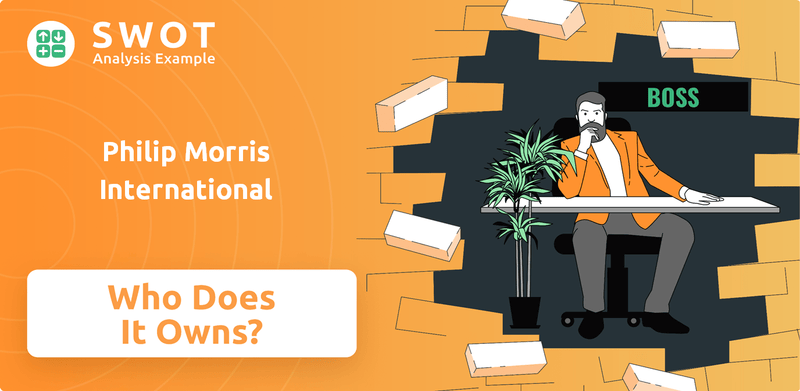
The story of Philip Morris International SWOT Analysis begins with its 2008 spin-off from Altria Group, a pivotal moment that reshaped its destiny. Today, as a publicly traded entity, PMI's ownership is diverse, reflecting a complex interplay of institutional and individual investors. Exploring PMI ownership unveils the forces shaping its future in the evolving landscape of the global tobacco market and its smoke-free ambitions, including the prominent IQOS brand, and helps answer questions like "Who is the CEO of Philip Morris International" and "Is Philip Morris International a public company?".
Who Founded Philip Morris International?
The story of Philip Morris International (PMI) begins with its roots in the 19th century. The company's origins can be traced back to Philip Morris, who opened a tobacco shop in London in 1847. Initially, the business operated as a private, family-owned entity.
Following Philip Morris's death, his wife Margaret and brother Leopold took over the business. As the company expanded, it was formally incorporated as Philip Morris & Co. Ltd. in 1902. This marked the beginning of a shift from a family-run operation to one involving external investors.
American investors, including Gustav Eckmeyer, became involved as the business grew. This led to the establishment of Philip Morris & Co. Ltd. Inc. in New York. However, specific details on the initial share allocations for these early investors are not available in public records.
Philip Morris started a tobacco shop in London in 1847. The business was initially a private, family-owned venture.
The company was incorporated in 1902 as Philip Morris & Co. Ltd. American investors later joined, leading to the formation of Philip Morris & Co. Ltd. Inc. in New York.
The early ownership structure evolved from a sole proprietorship to include family members and, eventually, external investors. The company's history is intertwined with the broader Philip Morris entity before the 2008 spin-off.
Philip Morris, Margaret Morris, Leopold Morris, and Gustav Eckmeyer were key figures in the early stages of the company. Their roles shaped the company's initial ownership and expansion.
The early agreements and expansions laid the groundwork for the complex ownership structures that led to the distinct Altria and PMI entities. These early decisions influenced the future of the company.
The concept of 'founding ownership' for the current Philip Morris International is linked to the historical development of the broader Philip Morris entity before its 2008 spin-off. This makes understanding the early history crucial.
The early ownership of PMI was a mix of family and external investors. The transition from a family-owned business to a company with American investors marked a significant change. To understand the full scope of the business, you can read more about the Growth Strategy of Philip Morris International.
- Early 1847: Philip Morris opens a tobacco shop in London, establishing the initial foundation of the business.
- 1902: The company is formally incorporated as Philip Morris & Co. Ltd., signaling the start of its expansion and transition from a sole proprietorship.
- Early 1900s: American investors, including Gustav Eckmeyer, become involved, leading to the establishment of Philip Morris & Co. Ltd. Inc. in New York.
- 2008: PMI is spun off from Altria Group, creating the current Philip Morris International entity.
Philip Morris International SWOT Analysis
- Complete SWOT Breakdown
- Fully Customizable
- Editable in Excel & Word
- Professional Formatting
- Investor-Ready Format
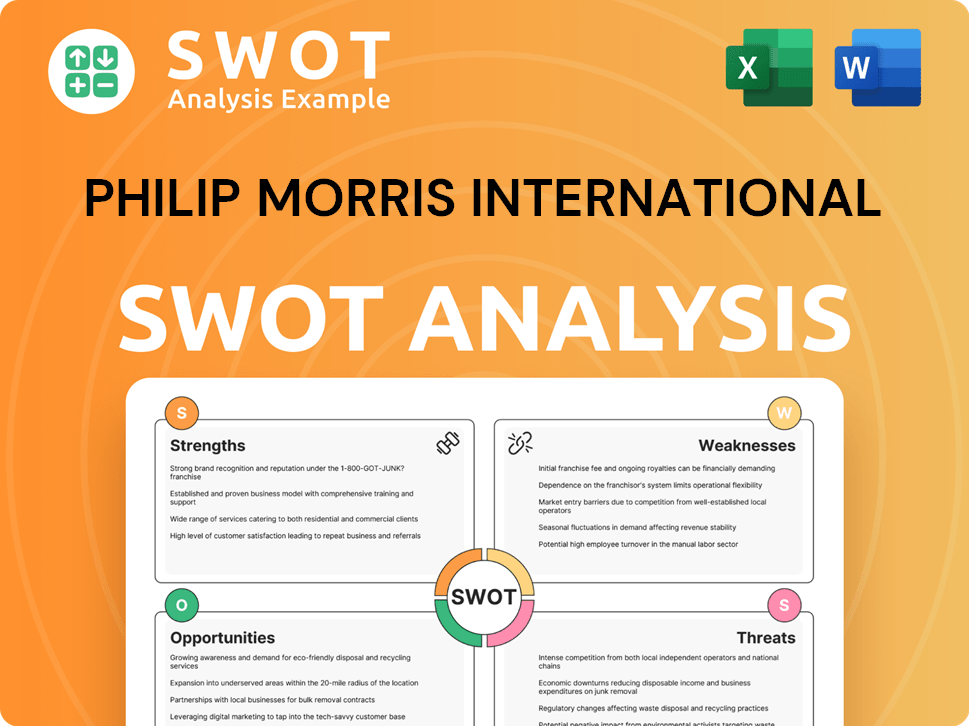
How Has Philip Morris International’s Ownership Changed Over Time?
The most significant shift in the ownership structure of Philip Morris International (PMI) occurred on March 28, 2008, when it was spun off from Altria Group. Before this, PMI operated as a subsidiary of Altria Group. The spin-off transformed PMI into an independent, publicly traded company, with shares distributed to existing Altria shareholders. This transition moved PMI's ownership from being controlled by a parent company to being directly held by a diverse group of public shareholders.
Since becoming independent, PMI's ownership has been largely influenced by institutional investors. This change has significantly impacted PMI's strategy and governance, making it directly accountable to its diverse shareholder base. The focus on shareholder value has driven PMI's investments in smoke-free products, aiming for growth in the evolving market. For example, as of the end of 2024, Vanguard Group held approximately 8.5% of PMI's shares, while BlackRock Inc. held around 7.9%.
| Key Event | Date | Impact on Ownership |
|---|---|---|
| Spin-off from Altria Group | March 28, 2008 | Transitioned PMI from a subsidiary to an independent, publicly traded company. |
| Initial Public Offering (IPO) | March 2008 | Shares offered to the public, broadening the shareholder base. |
| Ongoing Institutional Investment | 2008-Present | Institutional investors, such as Vanguard and BlackRock, became major shareholders. |
As of early 2025, prominent institutional investors like Vanguard Group Inc., BlackRock Inc., and State Street Corp. are among the top holders of PMI shares. These firms often hold significant percentages of outstanding shares, as detailed in their latest SEC filings. This widespread inclusion in index and passively managed funds reflects the company's importance in the global market. Understanding who owns PMI is crucial for investors and stakeholders alike.
PMI's ownership structure shifted dramatically with its spin-off from Altria in 2008, becoming a publicly traded entity.
- Institutional investors, including Vanguard and BlackRock, are major shareholders.
- The company is now directly accountable to its shareholders, influencing strategic decisions.
- Focus on shareholder value drives investments in smoke-free products.
- The company is listed on the New York Stock Exchange (NYSE).
Philip Morris International PESTLE Analysis
- Covers All 6 PESTLE Categories
- No Research Needed – Save Hours of Work
- Built by Experts, Trusted by Consultants
- Instant Download, Ready to Use
- 100% Editable, Fully Customizable
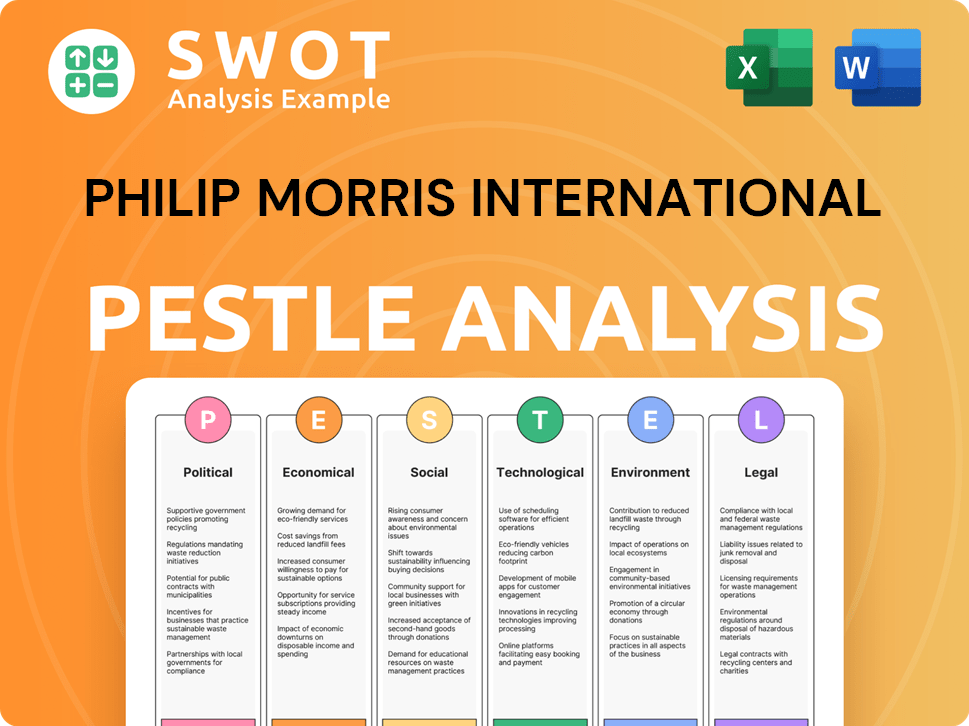
Who Sits on Philip Morris International’s Board?
As of early 2025, the Board of Directors of Philip Morris International (PMI) includes a mix of independent directors and executive leadership, reflecting a commitment to corporate governance. The board typically includes individuals with diverse backgrounds in finance, consumer goods, technology, and international business. Directors are elected by shareholders, and their relationship to major shareholders is primarily through their fiduciary duty to act in the best interests of all shareholders. Independent directors, who constitute a majority, are crucial for objective oversight and decision-making, ensuring that the board's actions are not unduly influenced by any single large shareholder or management.
The composition of the board can change, but it generally includes individuals with experience in various fields. For example, the board might include experts in areas such as finance, consumer goods, and international business. The board's structure and the roles of independent directors are designed to ensure that decisions are made in the best interests of all shareholders. This governance structure helps to maintain transparency and accountability within the company.
| Director Name | Position | Key Affiliations |
|---|---|---|
| Jacek Olczak | Chief Executive Officer | Philip Morris International |
| Lucio A. Noto | Chairman of the Board | Independent Director |
| Werner Geissler | Independent Director | Former Vice Chairman of Procter & Gamble |
PMI operates under a one-share-one-vote structure. This means each common share carries one vote. This structure ensures that voting power is directly proportional to the number of shares owned, preventing any single entity from having outsized control. This structure empowers institutional investors, given their substantial holdings, to exert influence through proxy voting on matters such as director elections, executive compensation, and significant corporate actions. The emphasis on independent directors and a one-share-one-vote system promotes a governance framework where decision-making is distributed among a wide range of investors. For more information, you can read about the Brief History of Philip Morris International.
PMI's board includes independent directors and executive leadership. The one-share-one-vote structure ensures fair voting power.
- Board members are elected by shareholders.
- Independent directors ensure objective oversight.
- Institutional investors have significant influence.
- The governance structure supports long-term value creation.
Philip Morris International Business Model Canvas
- Complete 9-Block Business Model Canvas
- Effortlessly Communicate Your Business Strategy
- Investor-Ready BMC Format
- 100% Editable and Customizable
- Clear and Structured Layout
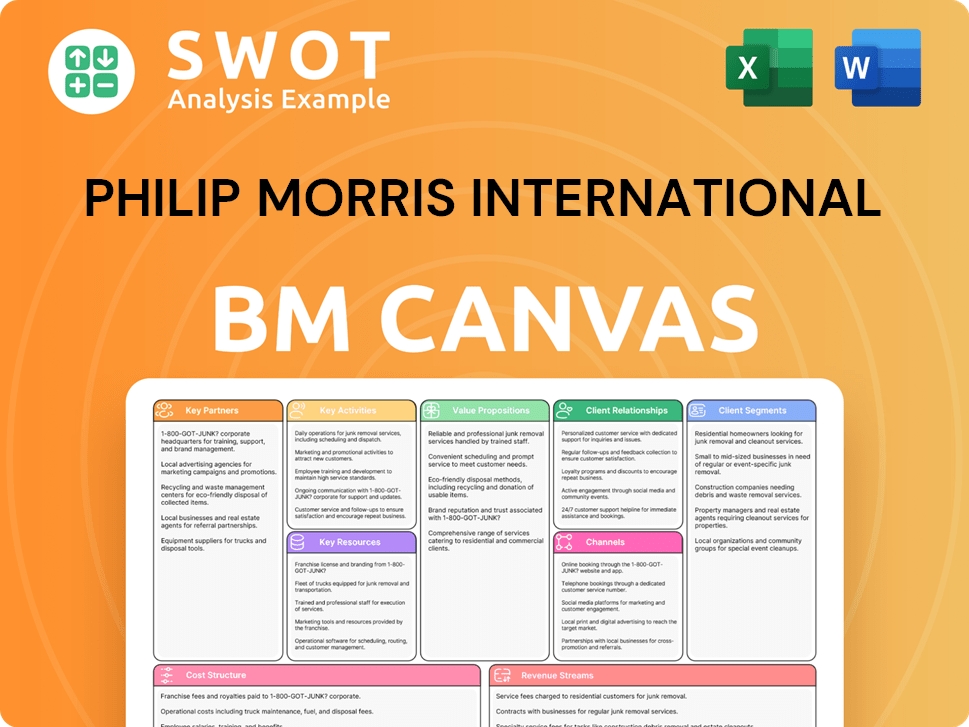
What Recent Changes Have Shaped Philip Morris International’s Ownership Landscape?
In recent years (2022-2025), the ownership of Philip Morris International (PMI) has largely remained stable, with institutional investors continuing to hold a significant stake. A major event impacting its structure was the acquisition of Swedish Match in November 2022 for approximately $16 billion. This move, which incorporated products like ZYN, expanded PMI's market reach, potentially attracting investors interested in the oral nicotine segment. This strategic shift towards smoke-free products has been a key focus, influencing the company's investor profile.
Industry trends, particularly the rise of ESG (Environmental, Social, and Governance) investing, have played a role in shaping PMI's ownership. While some ESG funds have divested from tobacco, others, especially those focused on 'harm reduction,' might view PMI's transformation positively. This could attract a new segment of ESG-conscious investors. Furthermore, PMI's ongoing share buyback programs, though specific figures for 2024-2025 are still emerging, are a standard method for returning value to shareholders, potentially altering ownership percentages among existing shareholders.
| Year | Key Development | Impact on Ownership |
|---|---|---|
| 2022 | Acquisition of Swedish Match | Expanded product portfolio, potential for new investor interest in oral nicotine. |
| 2023-2025 | Continued focus on smoke-free products | May attract ESG investors focused on harm reduction. |
| Ongoing | Share buyback programs | Reduces outstanding shares, potentially shifting ownership percentages. |
PMI's strategic direction, emphasizing its smoke-free vision, is consistently communicated to investors, influencing their perception and investment decisions. Analysts regularly assess PMI's progress in this transformation, with reports often discussing the implications for future ownership. For more insights into PMI's strategic direction, consider reading about the Growth Strategy of Philip Morris International.
The acquisition of Swedish Match in November 2022 for approximately $16 billion significantly broadened PMI's product offerings. This move included oral nicotine products like ZYN, expanding the company's market reach and potentially attracting new investors.
The rise of ESG investing is impacting PMI's ownership. Some ESG funds may divest, while others focused on harm reduction could see PMI's smoke-free transition positively. This creates a nuanced ownership trend.
PMI frequently engages in share buyback programs. These programs reduce the number of outstanding shares, increasing earnings per share and potentially shifting ownership percentages among existing shareholders.
Analysts continuously monitor PMI's progress in its smoke-free transformation. Their reports often discuss the implications for future ownership. The company's public statements reinforce its commitment to its vision.
Philip Morris International Porter's Five Forces Analysis
- Covers All 5 Competitive Forces in Detail
- Structured for Consultants, Students, and Founders
- 100% Editable in Microsoft Word & Excel
- Instant Digital Download – Use Immediately
- Compatible with Mac & PC – Fully Unlocked
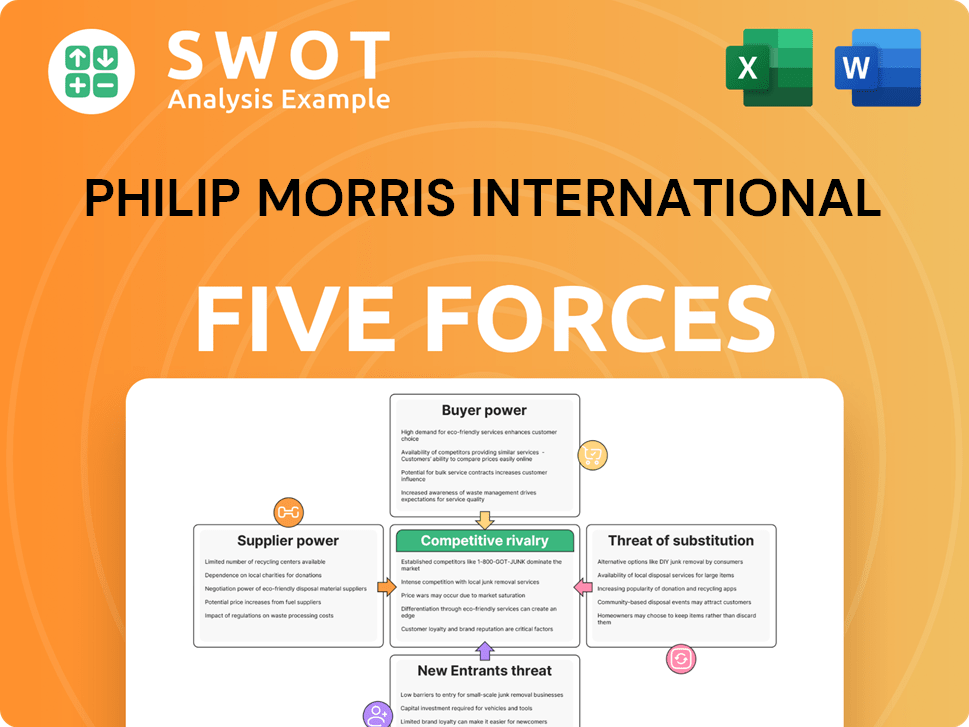
Related Blogs
- What are Mission Vision & Core Values of Philip Morris International Company?
- What is Competitive Landscape of Philip Morris International Company?
- What is Growth Strategy and Future Prospects of Philip Morris International Company?
- How Does Philip Morris International Company Work?
- What is Sales and Marketing Strategy of Philip Morris International Company?
- What is Brief History of Philip Morris International Company?
- What is Customer Demographics and Target Market of Philip Morris International Company?
Disclaimer
All information, articles, and product details provided on this website are for general informational and educational purposes only. We do not claim any ownership over, nor do we intend to infringe upon, any trademarks, copyrights, logos, brand names, or other intellectual property mentioned or depicted on this site. Such intellectual property remains the property of its respective owners, and any references here are made solely for identification or informational purposes, without implying any affiliation, endorsement, or partnership.
We make no representations or warranties, express or implied, regarding the accuracy, completeness, or suitability of any content or products presented. Nothing on this website should be construed as legal, tax, investment, financial, medical, or other professional advice. In addition, no part of this site—including articles or product references—constitutes a solicitation, recommendation, endorsement, advertisement, or offer to buy or sell any securities, franchises, or other financial instruments, particularly in jurisdictions where such activity would be unlawful.
All content is of a general nature and may not address the specific circumstances of any individual or entity. It is not a substitute for professional advice or services. Any actions you take based on the information provided here are strictly at your own risk. You accept full responsibility for any decisions or outcomes arising from your use of this website and agree to release us from any liability in connection with your use of, or reliance upon, the content or products found herein.